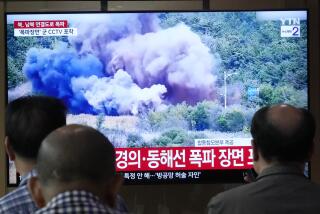South Korea braces for surprise attack despite North’s signs to contrary
- Share via
Reporting from Seoul — South Korean officials Tuesday braced for a possible surprise attack from North Korea and expressed new resolve to counter any aggression despite signals from North Korea that it would not retaliate for the South’s live-fire military drills in disputed Yellow Sea waters.
Two days after conducting an exercise similar to a November drill that triggered a deadly North Korean artillery attack on Yeonpyeong Island, South Korea kept fighter jets and a destroyer in the area to monitor the North’s military activities.
Though Pyongyang initially threatened to strike back if the South carried out moer drills on the island, which sits in what the North considers its territorial waters, on Monday the North declared that the South’s military exercises were “not worth reacting.”
That suggestion of restraint was praised Tuesday by New Mexico Gov. Bill Richardson as he left North Korea after five days of unofficial diplomatic negotiations with the communist government. Richardson praised the North’s “statesmanlike” response.
“They have shown, I believe, a step in the right direction,” Richardson told reporters in Beijing.
Nonetheless, Seoul on Tuesday declared that it was ready to face down any new North Korean threats or attacks. Last month’s artillery barrage against the island left four South Koreans dead; 46 crewmembers were killed in March when a Southern patrol boat was sunk, allegedly by a Northern torpedo.
Facing growing criticism for his military’s lackluster response to the attack last month, South Korean President Lee Myung-bak met with his top security advisors Tuesday. His administration has threatened to launch airstrikes if attacked again and has ordered more troops deployed to the nation’s five front-line islands, most of which are within sight of North Korea.
“When it provokes, we will firmly punish North Korea,” new Defense Minister Kim Kwan-jin told South Korean lawmakers Tuesday. “The army will make a strong response to all provocations.”
Some government critics contend that South Korea should reopen dialogue with the North, not ramp up tensions.
“A government’s mission should not be one on course for war but for peace,” South Korean lawmaker Chung Dong-young said. “If we really want to prevent war, we need courage to engage in dialogue. While in dialogue, there would be no sound of gunfire.”
Analysts said the North backed down this week in the face of South Korean firepower.
“Pyongyang probably realized that it would lose more than gain from further provocation,” said Cheong Seong-chang, an expert on inter-Korean relations at the Sejong Institute near Seoul.
But South Korean officials said the lack of an immediate response to the military drills did not mean Pyongyang was backing down. The North has deployed surface-to-air and anti-ship missiles and is poised to fire artillery, Seoul’s Yonhap news agency reported, citing an unidentified military official.
Still, North Korea offered a conciliatory gesture this week when it suggested a willingness to allow international inspectors to visit nuclear facilities for the first time since 2009, according to a CNN report. On Tuesday, the Chinese Foreign Ministry told reporters that Pyongyang should accept the return of International Atomic Energy Agency inspectors to ensure that the North is not processing uranium to highly enriched levels.
In Washington, the response was lukewarm.
“North Korea talks a great game. They always do,” State Department spokesman Philip J. Crowley told reporters. “The real issue is what will they do.”
Richardson told reporters that North Korea was close to returning to talks with the United States and four other nations aimed at persuading Kim Jong Il’s government to abandon its nuclear ambitions. “Maybe now is the time for the six-party countries to reach out to North Korea and say, ‘OK, let’s get down to business,’” he told CNN.
After an emergency meeting Sunday, the United Nations Security Council remained deadlocked over what course to take in the face of the tensions on the Korean peninsula, with China refusing to go along with calls to condemn North Korea for causing strife in the region.
But Seoul is taking its own steps. Officials have cut food and financial aid to the North and may use loudspeakers along the heavily guarded demilitarized zone between the two Koreas to broadcast propaganda to Northern residents.
On Tuesday, Seoul sent a more subtle but nonetheless determined message: After years of refraining from a practice that had irked the North, officials permitted the lighting of a 100-foot-tall steel Christmas tree that will be visible to North Koreans living near the DMZ.
Ethan Kim in The Times’ Seoul Bureau contributed to this report.
More to Read
Sign up for Essential California
The most important California stories and recommendations in your inbox every morning.
You may occasionally receive promotional content from the Los Angeles Times.














